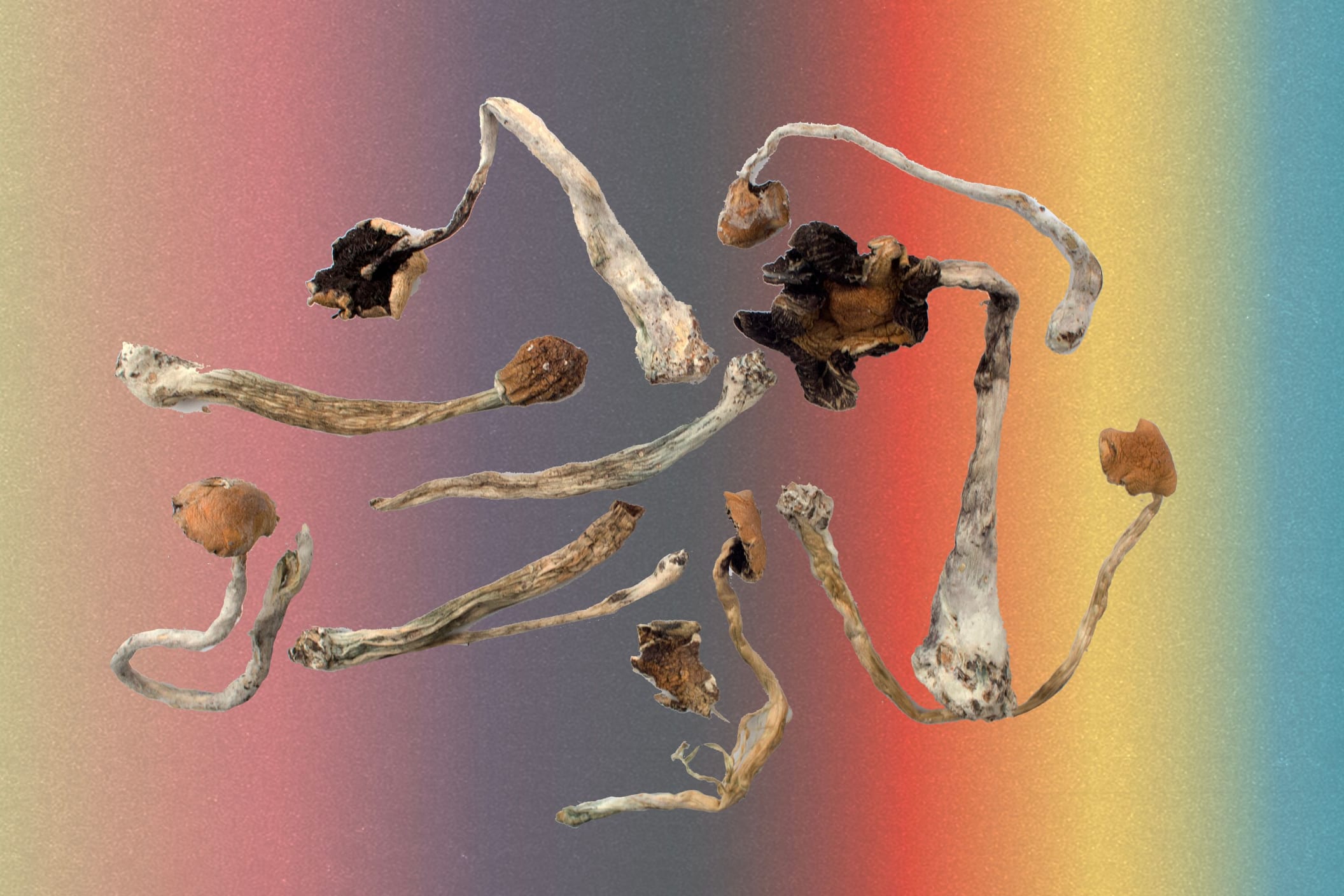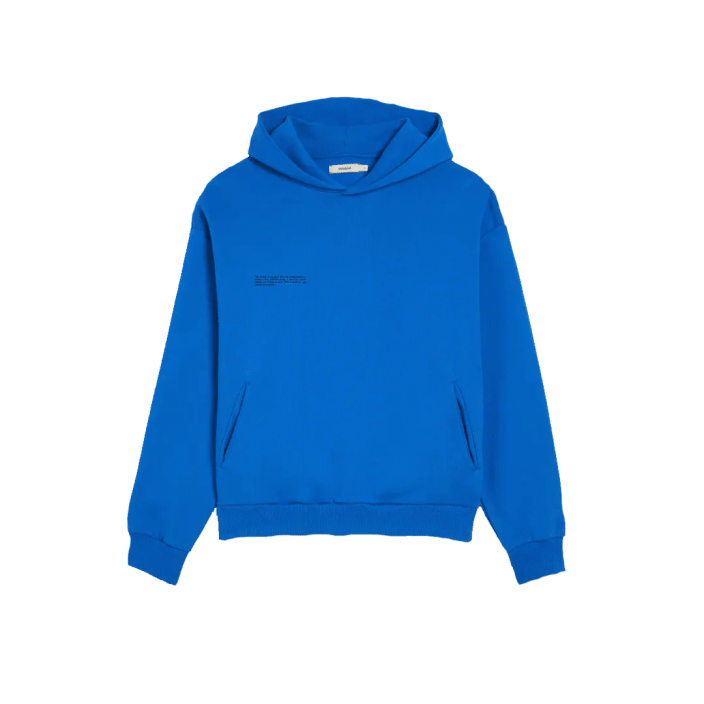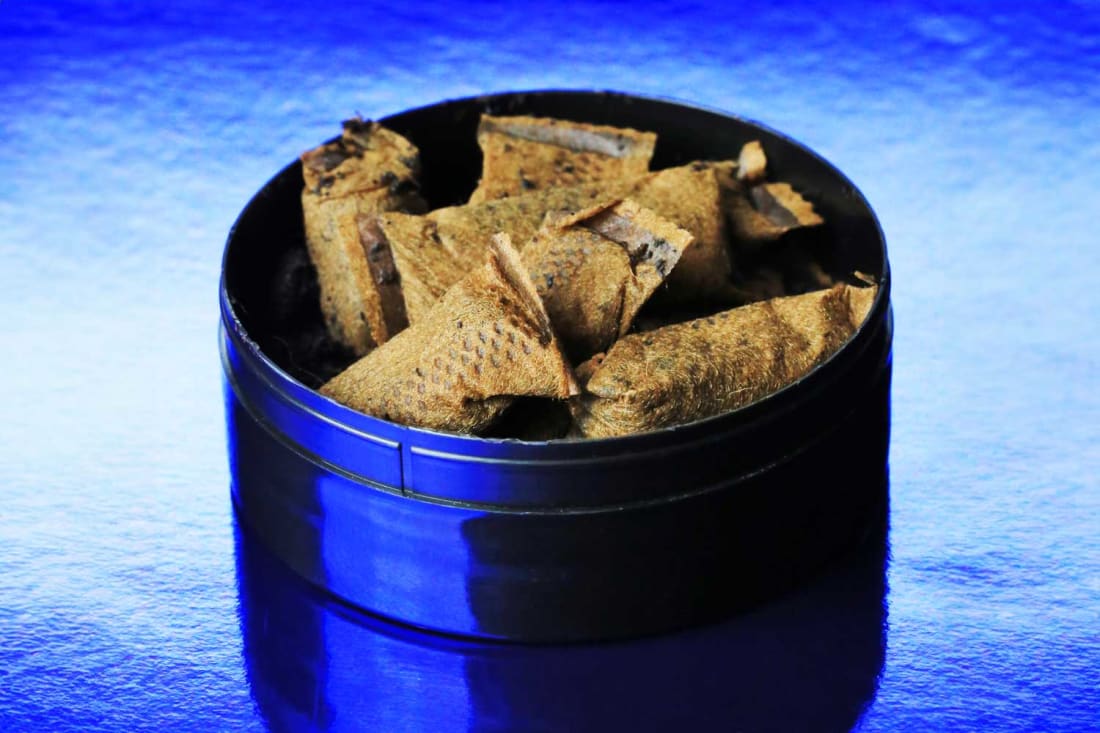Welcome to the Mushroom Renaissance
Funghi has found its way into skincare and coffee, while Harry Styles made an album on shrooms – all hail the mushroom?
Funghi has found its way into skincare and coffee, while Harry Styles made an album on shrooms – all hail the mushroom?
Much like the rhinestone eye makeup of Euphoria and Julia Fox, mushrooms are having a moment. Hop on TikTok, and you’ll find hordes of young fungi enthusiasts educating people on the difference between a King Trumpet and a Blue Oyster. Open Instagram, and you may stumble upon one of many dispensaries offering a variety of mushroom-based drinks, snacks and supplements to improve daily wellbeing. Meanwhile, awareness of the potential medicinal benefits of psilocybin (magic mushrooms) is growing as research into psychedelics becomes more mainstream. Celebrities from Harry Styles to Miley Cyrus are experimenting with mushrooms to boost their creativity (psilocybin-infused chocolate was Styles’ choice while recording his last album), while Mike Tyson has said that they helped save his life while on the brink of suicide. Now, everyone is tripping – a lot.
The recreational use of hallucinogens in the UK is currently at the highest rate since the mid-2000s, while the US is seeing the highest rate of psychedelic use among young people since 1982. This increase is partly down to COVID-19, which brought heightened feelings of anxiety and isolation that have caused people to gravitate towards psychedelics – particularly during lockdowns, when party drugs like cocaine and MDMA fell out of favour. Understandably, very few people felt compelled to gurn while doing a jigsaw or talking to their loved ones over Zoom. Psychedelics, however, can help improve mood in subtler ways without the soul-destroying comedown.
In the summer of 2020, Libby, 29, moved out of her London flat to stay with her girlfriend’s parents in Somerset, where they started taking long walks and foraging – ripe plums, nettles and wild garlic at first; anything they could eat or turn into a tea. “There was nothing to do at that time other than walk, so the foraging gave us something to focus on and have fun with,” she tells me.
On these walks, they started noticing Liberty caps – the most common magic mushroom – growing in some of the fields. After doing some research and knowing what to look out for – wobbly stem, dark gills, a cap which has a little “nipple” – they started foraging for those too. “I think there’s something special and intentional about consuming something you found yourself.”
Since then, mushrooms have become a semi-regular presence in their lives. Libby takes them once every couple of months, usually in the spring and summer, while her girlfriend is “more into the journey”, taking them more often and in higher quantities. “I notice that, especially in the days following, I feel less anxious and more open,” Libby says. “I've had social anxiety a lot in the past few years, and mushrooms have been able to cut through that and made me wonder why I care what others are thinking.”
They’ve also had a long-term impact on Libby’s perception of time – not in a scary, wading-through-imaginary-swamps like Raoul Duke in Fear and Loathing kind of way, but it awakened a sense of awareness over how much can be contained within a single moment. “The first time I tried them I remember thinking time was going so slowly that I took out my phone and tried to “record the clock” as “proof”,” she explains. “I couldn’t believe so much space could fit into a single second. The length of a second is normal again for me now, but I still sometimes remember how wild it is that a brain can stretch time like that.”
“The stress of the last few years has definitely led to more people self-medicating [with] psychedelics,” says Amanda Fielding, founder and director of The Beckley Foundation, which designs and develops psychedelic drug research to inform global policy. “The practice of microdosing, or the use of lower doses, which can enhance mood and creativity while still maintaining concentration and control of one’s own behaviour, is particularly popular at the moment.”
Rather than a sudden spike over the pandemic, mushroom usage has been steadily rising for years. The Global Drug Survey found that the number of people using magic mushrooms - as well as LSD, DMT and ketamine – doubled between 2015 and 2020. Another GDS report specifically on psychedelics supports Fielding’s findings on microdosing, with 6,500 out of 20,000 respondents reporting that they use psychedelics as self-treatment for psychiatric conditions and emotional distress.


Like with cannabis and DMT, developments are typically made in a medicinal setting first. Scientists and campaigners in the UK believe that magic mushrooms could have powerful potential for treating depression and PTSD, and have recently called on the government to consider legalisation. Despite having some of the lowest rates of harm of any drug, mushrooms are currently classified as a Schedule 1 substance. Drugs categorised this way (which also includes crack cocaine and heroin) are thought to have no therapeutic value, and usually require a licence from the Home Office for research.
“A quarter of people suffer from a mental health problem of some kind each year in England, putting a great burden on the NHS, which tends to prescribe medications that merely serve as a sticking plaster rather than addressing the underlying causes of the problem,” says Fielding. “The sensible first step would be to reschedule the classic psychedelics, and particularly psilocybin, from Schedule I to Schedule II, so that scientific research can be more easily undertaken, and doctors can prescribe them.”
Gains are already being made outside of the UK in this regard. After the cities of Denver, Oakland and Santa Cruz voted to decriminalise psilocybin throughout 2019 and 2020, Oregon became the first US state to legalise it for therapeutic use. Washington D.C. also voted for decriminalisation in 2021, while Canada granted permission for it to be used for end-of-life therapy. After decades of scaremongering around never-ending "bad trips" and people jumping off rooftops in an attempt to fly, which became attached to psychedelics during the countercultural movement in the 60s and 70s, there seems to be a shift in the way western societies are considering and classifying psilocybin. By the end of last year, The New York Times claimed that psilocybin and MDMA were poised to be “the hottest new therapeutics since Prozac”.

“Research is indicating that psilocybin and other psychedelics can represent a paradigm shift in the way we treat mental health problems in a more sustainable, holistic way,” says Fielding. “The next few years promise to be hugely exciting for psychedelic research and the role they will play in broader society [in terms of] the health, creativity and happiness of individuals and society as a whole.”
Alongside the mental health benefits of psilocybin, we’re also seeing an interest in the physical health properties of non-hallucinogenic mushrooms such as Lion’s Mane, Chaga, Ashwagandha and Reishi. “Mushrooms have been used for thousands of years for medicinal purposes, dating back to the Tao Dynasty,” says Andrew Salter, who co-founded the London-based company DIRTEA, which sells mushroom extract powders, alongside his brother Simon. After working intensely throughout their twenties, the Salters hit chronic burn-out. They developed insomnia and lost what Simon describes as their “zest for life”. They became interested in finding ways of integrating mushroom intake into their daily lives after attending a ceremony with a tea master, which they describe as having a “mind-blowing” effect on their physical and mental health.
“They’re anti-bacterial, they’re antiviral, they can improve your focus, clear your mind, help you sleep better. They consistently adapt to the body’s stresses,” Simon explains. “Chaga has more antioxidants than anything else on Earth – it’s the equivalent to 600 blueberries.”
After experiencing the benefits first hand, Andrew and Simon set out to create products that could be integrated into things we already drink day to day, such as teas, coffee and hot chocolate. Sourcing their mushrooms from a farm in the Fujan province of Southeastern China, run by a family who have been cultivating mushrooms there for over 600 years, they’re hoping mushrooms can eventually become a part of people’s daily ritual the same way multi-vitamins and supplements are now. “We want to strip down the misconception about mushrooms,” says Simon. “They’re one of our closest ancestors, we share 53% of our DNA with mushrooms. I think once you empower people about something that’s so good for them, they’ll find a way to habitualised to it.”
“We want mushrooms to become as important as brushing your teeth,” Andrew adds.
These aims can be seen outside of the marketplace, too. Cherece Lucina founded the London-based collective Create Conscious Community in 2017 with the aim of making spirituality more accessible, particularly for Black, Indigenous and Asian people, who are often excluded from the commercial wellness industry. Instead, Create Conscious Community provides a space for people to form connections to these things on their own terms, with recent events exploring traditional African spirituality, psychedelics and mindfulness, and mindful permaculture, which teaches people how to make medicines from foraged plants and mushrooms. “They’re generally collaborative and engaging and add a little bit more playfulness to those topics, which are often very taboo or made to feel very heavy,” Lucina explains.

Lucina started Create Conscious Community after a psychedelic experience in Amsterdam ten years ago. “I didn’t notice it immediately, but [a few years later] I was aware that there was a shift. I was more aware of my body and how it responded to things. I was aware of how my mood would shift throughout the day or after an experience. I just became a lot more sensitive to myself, and the reason for that was psychedelics,” she explains.
For Lucina, mushrooms are part of a way of life that prioritises self-sufficiency and self-care, whether that’s connecting with like-minded people and sharing skills or resources, taking a moment to acknowledge how you feel, or simply having fun and being present in the moment. The way Create Conscious approaches things also stems from acknowledging a disconnect in history. “My mum is from St Vincent and grew up learning how to grow all sorts of plants. Every summer she’s got the whole garden growing, but this was a skill she didn’t necessarily pass down to me,” she says. “Slowly generations will lose all the things they have. Ancient methodologies and techniques that have been learned for years are slowly being forgotten because there’s a supermarket two minutes down the road.”
For Lucina, learning these skills and practising mindfulness “pulls you closer” to your ancestors by rebuilding the connections broken by capitalism. “I think we’re going to be seeing a lot more autonomy and questioning of the reality or the context that we’re living in,” Lucina says. “Hopefully a change that’s more liberated, and with a lot less of the pressures that stop people from being able to collaborate as a community and support each other without relying on money.”
“Psychedelics can help people reconnect with themselves, with each other, with nature, or with a higher power – whatever that may mean to them, whether it be spiritual or secular – and participants in studies have reported the experience as being one of the most profound and meaningful of their lives,” Fielding adds, emphasising - as Lucina does - the importance of playfulness within all this.
“There is a strange aversion to the notion of taking compounds purely for fun, even though many people do exactly that with alcohol,” Fielding says. “But they can help to improve our appreciation of art, beauty, and nature; to strengthen the bonds between people; and to bring out some of the nobler qualities of man. That can be beneficial for someone without a diagnosed medical condition, just as it can for someone with a mental health concern.”
Echoing Libby’s formative experience with mushrooms altering her perception of time, Lucina says they shifted her perspective of what life could be. She realised she didn’t have to resign herself to an individualised “hustle and grind” routine that was actively working against her, or view death as a permanent loss. “There’s a lot of experience of the quantum world in psychedelics, because your ego is shed so much that the boundaries you had before dissolve,” Lucina explains. Experiencing mushrooms itself was like, ok, if the world can get as weird as this on mushrooms then it can literally be anything. There’s so much power in that.”
“Research is indicating that psilocybin and other psychedelics can represent a paradigm shift in the way we treat mental health problems in a more sustainable, holistic way,” says Fielding. “The next few years promise to be hugely exciting for psychedelic research and the role they will play in broader society [in terms of] the health, creativity and happiness of individuals and society as a whole.”
Enjoyed this article? Delve into the ever-evolving world of psychedelics with our new original series, The Bigger Trip







